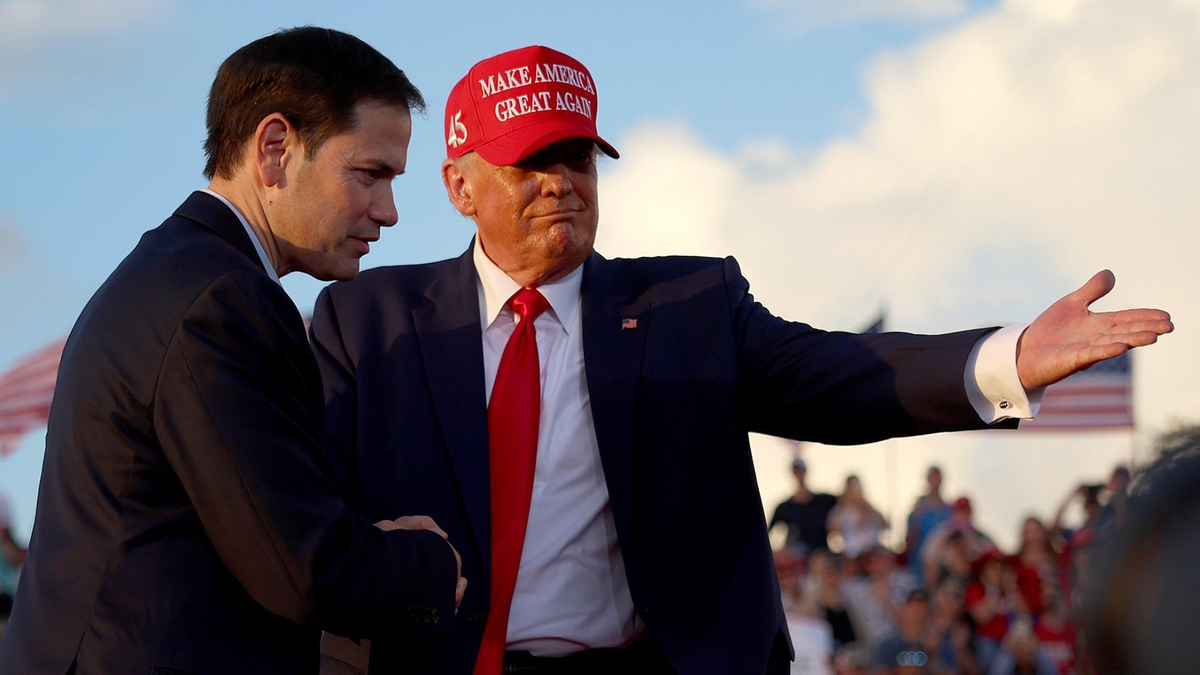The Trump-Rubio European Strategy: Goals And Potential Results

Table of Contents
Differing Approaches to Transatlantic Relations
Donald Trump and Marco Rubio, while both Republicans, hold significantly different perspectives on US relations with Europe. Understanding these differences is vital to comprehending the potential implications of any combined strategic approach.
Trump's "America First" Approach
Trump's "America First" doctrine prioritized national interests above all else, often leading to strained relationships with traditional US allies in Europe. His skepticism towards multilateral institutions and his emphasis on bilateral deals fundamentally challenged the established framework of transatlantic cooperation.
- Withdrawal threats from NATO: Trump repeatedly questioned the value of NATO, threatening to withdraw the US if European allies didn't increase their defense spending significantly. This rhetoric undermined the alliance's credibility and sowed discord among member states.
- Emphasis on burden-sharing and renegotiating trade agreements: Trump consistently pressed for greater financial contributions from European nations to NATO and aggressively renegotiated, or threatened to withdraw from, trade agreements, citing unfair trade practices. This protectionist stance caused considerable friction.
- Prioritization of national interests over collective security: Trump's focus on bilateral deals and his transactional approach to foreign policy prioritized short-term national gains over long-term collective security objectives, raising concerns about US reliability as a partner.
Rubio's Conservative Internationalism
In contrast to Trump's isolationist tendencies, Rubio advocates for a more assertive and engaged US role in global affairs, rooted in a conservative internationalist framework. He emphasizes the importance of strong alliances and a robust defense posture.
- Emphasis on strengthening NATO and confronting Russian aggression: Rubio has been a strong proponent of a strengthened NATO alliance, advocating for increased military spending and a more assertive response to Russian aggression in Eastern Europe. He sees NATO as essential for containing Russian expansionism.
- Support for free trade agreements while addressing concerns about fair competition: While supporting free trade, Rubio acknowledges the need to address concerns about unfair trade practices and ensure a level playing field for American businesses. He favors reforming rather than abandoning trade agreements.
- Focus on promoting democratic values and human rights in Europe: Rubio champions the promotion of democratic values and human rights across the globe, including in Europe. He views the US as a vital force in upholding these principles.
Potential Goals of a Hypothetical "Trump-Rubio" Strategy
A hypothetical "Trump-Rubio" European strategy would necessitate a compromise between these seemingly opposing approaches. While unlikely in practice given their contrasting styles, a theoretical synthesis could yield interesting results.
Strategic Realignment within NATO
Balancing Trump's demand for greater burden-sharing with Rubio's commitment to collective defense could involve a strategic realignment of NATO's focus and responsibilities.
- Negotiating updated defense spending commitments from European allies: This would entail a pragmatic approach to securing greater financial contributions from European members, possibly through tailored agreements and incentives.
- Focusing on specific areas of joint military operations and intelligence sharing: Rather than a blanket increase in spending, the focus could shift to collaborative efforts in specific areas of mutual concern, optimizing resource allocation.
- Addressing concerns about fair contributions to collective security: This would involve transparent mechanisms for assessing contributions and addressing perceived imbalances, potentially leading to a more equitable distribution of responsibilities within the alliance.
Trade Policy and Economic Relations
Reconciling Trump's protectionist tendencies with Rubio's support for free trade would require a nuanced approach to trade policy.
- Negotiating revised trade deals that address specific concerns while maintaining open markets: This would involve targeted negotiations to address legitimate concerns about unfair trade practices while preserving the overall benefits of open markets and transatlantic trade.
- Focusing on cooperation in areas like technology and innovation: Collaboration on cutting-edge technologies and innovation could foster economic growth and mutual benefit, transcending some of the traditional trade friction points.
- Addressing issues of intellectual property and fair competition: A concerted effort to establish clear rules and regulations concerning intellectual property rights and fair competition could help to alleviate tensions and create a more equitable trading environment.
Potential Results and Outcomes of this Strategy
The potential results of a blended Trump-Rubio strategy are multifaceted, encompassing both positive and negative outcomes.
Strengthened Transatlantic Ties
A successful synthesis could lead to stronger transatlantic ties, based on a more balanced and equitable partnership.
- Enhanced collective security against shared threats: A modernized and more effectively funded NATO could enhance collective security against common threats such as terrorism and Russian aggression.
- Increased economic cooperation and prosperity: Revised trade deals and increased economic cooperation could lead to increased prosperity on both sides of the Atlantic.
- Stronger democratic alliances: A renewed commitment to shared democratic values and human rights could strengthen democratic alliances and promote stability in Europe and beyond.
Increased Internal Tensions
However, this strategy also carries risks of internal tensions and potential setbacks.
- Political divisions within the US regarding foreign policy: The inherent tensions between Trump's and Rubio's approaches could lead to internal divisions within the US political landscape regarding foreign policy priorities.
- Resistance from European allies to certain demands: European allies might resist certain demands for increased defense spending or changes to trade agreements, potentially leading to disagreements and strained relations.
- Potential for diplomatic setbacks and strained relations: Even with a compromise, the inherent differences in approach could lead to diplomatic setbacks and strained relations in certain areas.
Conclusion
This analysis of a hypothetical "Trump-Rubio" European strategy reveals the complex interplay between different approaches to transatlantic relations. While a blend of their viewpoints could potentially lead to stronger alliances and economic partnerships, it also carries the risk of internal tensions and diplomatic challenges. The success of such a strategy hinges on finding a balance between national interests and collective security, fostering a renewed spirit of cooperation while effectively addressing concerns about burden-sharing and fair trade. Further research and analysis of the evolving political landscape are essential for understanding the future of the Trump-Rubio European strategy and its potential impact on global affairs. Understanding the nuances of this hypothetical strategy is crucial for navigating the future of US-European relations.

Featured Posts
-
 Bennedict Mathurins Overtime Heroics Lead Pacers Past Nets
May 29, 2025
Bennedict Mathurins Overtime Heroics Lead Pacers Past Nets
May 29, 2025 -
 New Pokemon Tcg Expansion Pocket Celestial Guardians Launch Event Information
May 29, 2025
New Pokemon Tcg Expansion Pocket Celestial Guardians Launch Event Information
May 29, 2025 -
 Harry Potter Tv Series Casting News For Harry Hermione And Ron
May 29, 2025
Harry Potter Tv Series Casting News For Harry Hermione And Ron
May 29, 2025 -
 Post Fire La Rent Increases Spark Price Gouging Debate
May 29, 2025
Post Fire La Rent Increases Spark Price Gouging Debate
May 29, 2025 -
 Cafus Real Madrid Pick Snub For Mbappe And Vinicius
May 29, 2025
Cafus Real Madrid Pick Snub For Mbappe And Vinicius
May 29, 2025
Latest Posts
-
 Sacramento County Wastewater Shows Presence Of Measles Virus What You Need To Know
May 30, 2025
Sacramento County Wastewater Shows Presence Of Measles Virus What You Need To Know
May 30, 2025 -
 Meningkatnya Kasus Suspek Campak Di Pohuwato Peran Imunisasi Anak
May 30, 2025
Meningkatnya Kasus Suspek Campak Di Pohuwato Peran Imunisasi Anak
May 30, 2025 -
 Kasus Suspek Campak Di Pohuwato Meningkat Dinkes Gorontalo Sebut Imunisasi Anak Rendah
May 30, 2025
Kasus Suspek Campak Di Pohuwato Meningkat Dinkes Gorontalo Sebut Imunisasi Anak Rendah
May 30, 2025 -
 Analyza Svatku Guru Jary A Jeho Dopadu Na Svet Tomase Koloce Vedeny Vladimirem
May 30, 2025
Analyza Svatku Guru Jary A Jeho Dopadu Na Svet Tomase Koloce Vedeny Vladimirem
May 30, 2025 -
 Vyznam Vladimira Jako Vudce Svobodneho Sveta V Kontextu Svatku Guru Jary Svet Tomase Koloce
May 30, 2025
Vyznam Vladimira Jako Vudce Svobodneho Sveta V Kontextu Svatku Guru Jary Svet Tomase Koloce
May 30, 2025
